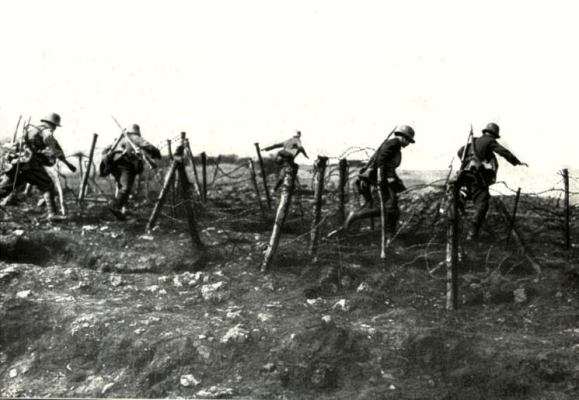
The Glory of Battle
The spring of 1916 was proving to be much more damp than normal. Unseasonably wet conditions had slowed the advance considerably on both flanks. 5. Armee had seen little action as it swung along the coastal towns of the southern Baltic Sea. Cavalry detachments had fought rapid engagements with small numbers of bandits on the outskirts of the old port of Rostock, but they had quickly shouldered the opposition aside. Scouts were however, finding more encampments of migrants along the roads. Much farther south, 3. and 4. Armee were pressing on Dresden and were having a much more difficult campaign. They were weeks behind schedule, having been checked at Leipzig, where a determined defence of the city had forced a bloody and time consuming affair, culminating in an assault on the centre of the metropolis which had eventually dislodged the defenders.
The lines of the central front had been pushed steadily eastwards by the efforts of the main weight, taken by 2. and 6. Armee. They were within miles of Berlin when they had been ordered to halt and await their compatriots from 5. Armee, who were presently shifting southwards towards the northern periphery of the former capital region. It had been estimated that upwards of 30,000 radicals and outlaws were barricaded in the city. The overall commander of the attack, General der Infanterie von Hindenburg, had received strict orders from the Chief of the General Staff, that Berlin was not to be razed nor unnecessarily damaged. His usage of artillery therefore became a political decision and not a tactical one, much to his chagrin. The lines settled, as the senior leadership prepared their forces for the culmination of their campaign in Europe.
With the realization that specialized tactics would be needed as preparatory and supporting barrages would be extremely limited in the coming engagements, the veteran soldiers of the strategic reserve for the central arm, 1. Armee, were selected as Stoßtruppen, or shock troops, to lead the assault. The subunits were reorganized into Sturmabteilung, or assault battalions and given specialized roles of infiltration and exploitation. Their preparations were rigourous and thorough; they trained storming barricades, entrenchments and bunkers, fighting through residences and factories and using explosives and grenades to clear objectives.
At dawn on a misty morning in May, a light initial barrage was dropped on the opposing lines and the assault went ahead.

Stoßtruppen on the Advance
The assault battalions surged forward and immediately blew gaps in the enemy lines on the western edge of the city. Many had no time to withdraw or regroup before their defences were overcome by the following waves of infantry from 2. and 6. Armee, designed to exploit the weaknesses. Street by street, German soldiers advanced.
The battle began devolving into chaos, as surrounded pockets of brigands were killed to the last man and organized resistance began to flounder with no centralized leadership or communication. Within three days of the start of the effort, a company of pioneers assaulted an enemy reboubt beneath the Brandenburg Gate with a recently modeled field weapon known as a flamethrower. Dozens were caught in the charnel house and burned alive, with the remainder promptly surrendering out of sheer terror.
Men of the 5. Armee crossed the Spree River in conjunction with this attack and simultaneously entered the hollow shell of the former Reichstag. In a monumental symbol of progress, a work party climbed to the roof of the heart of the old Empire and raised the German flag above the city. Within two more days, the entire city had fallen and the sounds of gunfire faded from the streets.
By June, Dresden was in German hands as well.
Von Hindenburg sent a short communique to his superior in New Luebeck, Generalfeldmarschall von Moltke.
Berlin has fallen. I await the Kaiser on the steps of the Reichstag.

